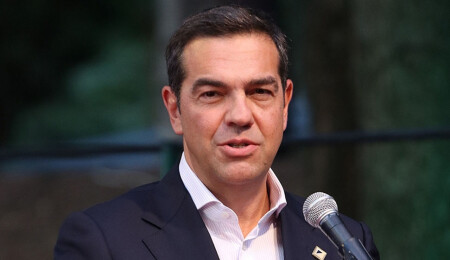Tsipras Claims 2017 UN Plan Was Missed Chance for Cyprus Settlement

The UN framework for a Cyprus settlement presented in 2017 during negotiations at Crans Montana could have formed the basis for a just and viable solution, former prime minister of Greece Alexis Tripras says in his book Ithaca, released on Monday.

He also says he had been informed that Turkey could – under certain conditions – discuss the abolition of guarantees in Cyprus and that the Turkish foreign minister was willing to meet with Tsipras, however former president Nicos Anastasiades believed it was a bluff.
In the book’s chapter titled “Cyprus issue, one breath away from the solution”, Tsipras says that the Syriza government had decided not to get involved in the remaining internal aspects of the Cyprus issue, but only in the international security aspect, demanding the withdrawal of the occupation troops and the lifting of the framework of the guarantor powers, which concerned Greece, Turkey and Great Britain.
“A consistent and publicly stated Greek and Greek Cypriot position throughout all the talks was the need for the immediate abolition of the anachronistic, post-colonial system of guarantees and the withdrawal of the Turkish occupation troops from the island”, he adds.
Tsipras refers to the negotiating tactics of the Greek and Greek Cypriot sides, which provided that he himself would not participate in the process unless there were serious indications of a positive outcome.
“On December 14, 2016, in Brussels, we held the most substantial coordination meeting with the president of Cyprus and his team in view of the conference that would follow.
“We agreed in a clear manner and without evasions on our negotiating tactics and our red lines. Part of our strategy was that I would not participate in the negotiations until it became clear that there was a realistic possibility of a positive outcome,” Tsipras says.
He adds that he was anxiously awaiting developments in the negotiations, hoping that progress would also be made on the issue of security and guarantees, so that he himself could go to Geneva.
Then, in an effort to take a more active role, he invited the then prime minister of Turkey, Binali Yildirim, to Greece, where he found that despite the fact that he insisted on his country’s positions, he left “a window for the role of the EU in the future security framework in a federal Cyprus”.
The two agreed to meet in Crans Montana “once the conditions for a solution had been created”.
Tsipras believes that the submission of the Guterres framework by the UN secretary-general himself was a significant success and could have formed the basis for a just and sustainable solution.
In particular, he points out “the secretary-general’s statement that the treaty of guarantees is unsustainable and must be replaced by a framework for monitoring the settlement agreement based on the UN and in which Greece, Turkey and Britain could have a role”.
“The intransigence of the Turkish side, however, in the final phase of the negotiations, namely at the July 6 [2017] dinner, to openly accept this framework as a basis for discussion, left no room for my participation, as well as that of the Turkish Prime Minister, in the conference and nullified any prospect of a solution, ultimately leading the talks to failure.”
Tsipras says that Turkish foreign minister Mevlut Cavusoglu’s move to deliver a message to Antonio Guterres, which said that his country could, under certain conditions, discuss the abolition of the guarantees, “created positive expectations and hope” at that moment.
For this reason, Tsipras expressed his desire to go to Crans Montana but Anastasiades expressed reservations.
“In the critical hours of the positive glimmer in the negotiations, when they had conveyed to me what the Turkish foreign minister had said to the UN secretary-general regarding the framework of guarantees, I had an important discussion with Nicos Anastasiades. I expressed to him my desire to go to Switzerland, as we had agreed that I would do if there was a positive perspective. However, he himself was extremely cautious,” Tsipras says.
Tsipras explains that Anastasiades “believed that it was a bluff on the part of the Turkish side and did not share my own – albeit very restrained – optimism”.
“Perhaps he had also been influenced by the course of the negotiations on the internal aspect, which from what he explained to me was not going well and he was disappointed. In any case, his negative stance on my possible trip to Switzerland ultimately left no room for us to investigate at the level of prime ministers whether the message that the Turkish foreign minister had given, in private to the UN secretary-general, regarding the abolition of the guarantees, had any basis or was a Turkish negotiating bluff.”
Tsipras says that “a few hours later, at the dinner on July 6, Cavusoglu’s official stance was completely different from the one conveyed to us by Guterres”.
“The intransigence of the Turkish side to discuss the timetable for the withdrawal of the occupation troops and to openly accept the abolition of the guarantees as a basis for discussion ultimately led to the failure of the conference,” Tsipras says.
Source: Cyprus Mail


Comments
Attention!
Sending all kinds of financial, legal, criminal, administrative responsibility content arising from illegal, threatening, disturbing, insulting and abusive, humiliating, humiliating, vulgar, obscene, immoral, damaging personal rights or similar content. It belongs to the Member / Members.